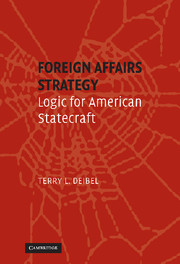Book contents
- Frontmatter
- Contents
- Preface and Acknowledgments
- 1 Introduction: Defining Strategy
- PART I ASSESS
- PART II ANALYZE
- 4 Interests, Threats, and Opportunities
- 5 Power and Influence
- PART III PLAN
- APPENDIX A Definitions of Grand Strategy, National Security Strategy, and Statecraft
- APPENDIX B A Linear Design for Foreign Affairs Strategy
- Index
5 - Power and Influence
Published online by Cambridge University Press: 05 June 2014
- Frontmatter
- Contents
- Preface and Acknowledgments
- 1 Introduction: Defining Strategy
- PART I ASSESS
- PART II ANALYZE
- 4 Interests, Threats, and Opportunities
- 5 Power and Influence
- PART III PLAN
- APPENDIX A Definitions of Grand Strategy, National Security Strategy, and Statecraft
- APPENDIX B A Linear Design for Foreign Affairs Strategy
- Index
Summary
We have defined strategy as the relationship in thought and action between ends and means, as a systematic way of achieving objectives through the application of resources. Assessing interests (and the threats and opportunities that relate to them) is the first step toward purposeful statecraft, for the process of setting strategic objectives must begin with a clear view of the values strategy is designed to serve. But the strategist cannot even finalize his or her goals, let alone make progress toward their achievement, without also looking carefully at the other end of the ends-means equation. Strategists must grapple, in other words, not only with interests, threats and opportunities, but also with the concept of national power.
Power is the motive force of statecraft, the capacity to act in foreign affairs. It is necessary in order to get things done, to accomplish one's purposes, to carry out one's own will despite the resistance that accompanies all strategic endeavors. But although power is vital to the successful conduct of statecraft, and despite the fact (as noted in Chapter 2) that states in an anarchic world have no choice but to seek power in order to survive, it is still possible to exaggerate its role. Some analysts even go so far as to conclude that power is itself a goal of policy, as in Hans Morgenthau's classic assertion “that statesmen think and act in terms of interest defined as power.”
- Type
- Chapter
- Information
- Foreign Affairs StrategyLogic for American Statecraft, pp. 157 - 204Publisher: Cambridge University PressPrint publication year: 2007



